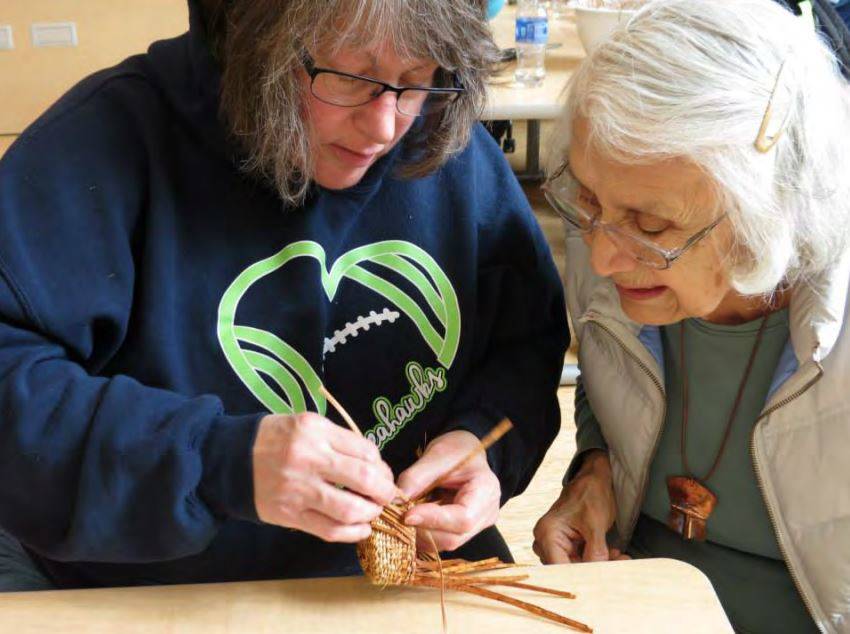When Haida weaver Delores Churchill was very young, an old chief told her never to talk about herself or her family for too long.
Years later, when Churchill accepted the Lifetime Achievement Award at the 82nd annual Tribal Assembly this Wednesday, she remembered that lesson. She spoke for just under five minutes, hardly mentioning anything about herself.
“If you want to find out about me,” Churchill said with a smile, “read about me on Wikipedia.”
Her achievements over the past few decades have earned her a spot on the online encyclopedia, from her award-winning Haida artwork to her work to keep the Haida language and culture alive.
She’s earned numerous awards, and Central Council of Tlingit and Haida President Richard Peterson said that the Smithsonian Institute is planning on making a documentary about her life in the near future. One of the duties of his job is selecting the recipient of the President’s Lifetime Achievement Award, and the process this year wasn’t much of a challenge.
“Dolores was easy,” Peterson said. “She’s had such a huge impact.”
The efforts of Churchill — who is based in Ketchikan — to preserve native culture have made her a figurehead in the community of Northwest tribes. She picked up that drive from her mother, Selina Peratrovich, who was also a major influence in keeping Haida culture alive.
Peratrovich was strict in her pursuit of perfection with artwork. Peterson shared an anecdote that if Churchill’s weaving was imperfect as a child, Peratrovich would toss the project into the fire. This in turn made Churchill a bit of a perfectionist with her work.
Churchill went even a step further with her desire to learn about weaving techniques. She would go to museums when she was young to look at artifacts and try to teach herself how they were created. Her research was exhaustive, and that passion has rubbed off on others.
“Wherever she goes, she’s like the Pied Piper,” Peterson said. “She gets people excited about language, about her art and they start getting involved. You hear about commitment of wanting to learn because of the example she’s set. And you know, she’s not done.”
She was only able to spend one night in Juneau this week during Tribal Assembly because she had business down in Washington. She remains extremely active and her mind and wit are still as sharp as ever.
Her brief speech to the Assembly was littered with bits of humor, but she struck a serious tone at times. She immediately expressed a bit of regret that her mother and other artists who taught her weren’t around to see her there on the stage at Elizabeth Peratrovich Hall in Juneau.
Churchill wore slippers made by a dear family friend and wore the same green dress she had worn in a meaningful picture she took with her mother years ago.
“All these people were so loving and so caring,” Churchill said, “and I carry their memories with me every day.”
Her words fit perfectly with the theme of this year’s Tribal Assembly, “Looking to Our Past, Living for Our Future.” A recent part of that past for Haida and Tlingit individuals in the area is a loss of much of the native language. As former Assembly President Ed Thomas explained Friday, many of the parents of his generation thought assimilating into an English-speaking culture would be helpful for getting jobs, and that was one reason the Haida and Tlingit languages have faded almost out of existence. Another major reason was the forced assimilation that went on throughout the state, where children were taken from their homes and put in schools that stifled their ability to speak their native language.
Thomas said that Churchill was excellent at networking, using her charisma and wit to be an effective representative. He said that her speech to the Assembly on Wednesday was indicative of how effective of a communicator she can be. Almost without effort, she can command the attention of a room and get the most out of others.
“Her personality is one that brings about people listening to her because she’s got that presence and personality,” Thomas said. “That’s kind of one that lets people listen, just because of her personality.”
This mix of talent and personality, both Peterson and Thomas said, is what has made Churchill such an important force in the restoration of Native culture. Her influence isn’t limited to Haida or even to Alaska Native culture, Peterson said, as her legacy — so far, at least — is one of promoting unity across the board.
“I don’t think she cares much for worrying about what color you are or what her background is,” Peterson said. “Native, non-native, she teaches. I see that. She’s a bridge-builder.”
• Contact reporter Alex McCarthy at alex.mccarthy@juneauempire.com or 523-2271

